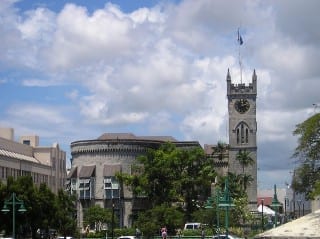While Parliament in Barbados was established in 1639, the House of Assembly was not confirmed by law until 1660. The members met in various places, such as taverns and shops and, in HP’s time, the Town Hall, until the current Parliament Buildings were built in 1874. Henry Peter Simmons represented the parish of St. Philip, where he lived at the time, between 1811-1812 and 1813-1814. In that era the length of a term was only one year. How I wish that was still the case!
From reading the minutes of the House of Assembly in the Barbados Mercury and Bridge–Town Gazette papers, I discovered that HP jointly represented St. Philip with John Thomas Lord, who was the brother of the reputed pirate Sam Lord. I wanted to see what kind of issues HP voted for or against in his tenure so that I would be able to discover some more of his character, but I didn’t come across anything juicy. I noticed, though, that he seemed to miss quite a number of the sessions and on the occasions that he was required to vote, he dissented more often than he agreed.
He also seemed to be quite vocal in his opinions. In the Assembly minutes of Tuesday November 3, 1812 it was reported: “The 43rd clause was read and agreed to – Mr. Sullivan, Mr. Robert J. Haynes and Mr. Simmons dissenting: the latter of whom, on giving his vote expressed himself at large.” I love that!
Yes, HP was not one to hide his opinions. In his first two letters to the Right Honourable Earl Grey, Lord of the Treasury in England, he strongly put forward his case against abolition. In his 1832 letter he argued against abolition on the basis that slaves received better treatment and had greater material security than the poor in England. The major emphasis of that letter was to protest against “any interference with his colonial property without receiving ample compensation”.
The major theme of his second letter (1833) was that “the Negro is not yet fitted for his freedom because he is morally and intellectually ‘defective’ with evidence”. I’m on a mission to get my hands on those letters, which are in the British Library, to see that “evidence” for myself and to gain greater insight into his character.
When I get them I will share, so stay tuned.

